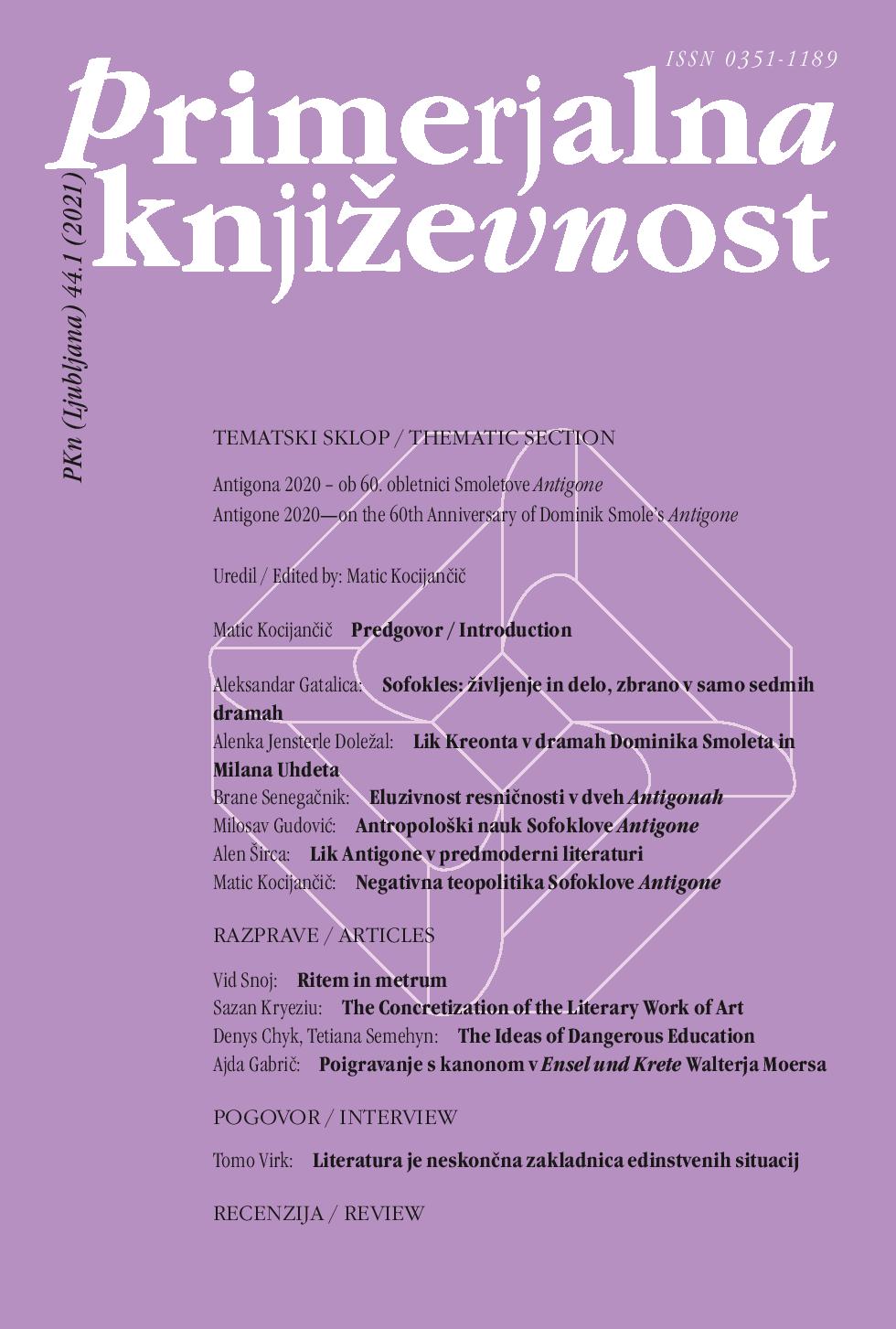The Ideas of Dangerous Education: Modification of the Pedagogical Novel in Oliver Twist by Charles Dickens and “The Gemini” by Taras Shevchenko
DOI:
https://doi.org/10.3986/pkn.v44.i1.09Keywords:
English literature, Ukrainian literature, Dickens, Charles, Shevchenko, Taras, Bildungsroman, pedagogical experiment, education, environment, twins, psychomachiaAbstract
The article deals with usage of the pedagogical genre in the novels Oliver Twist by Victorian writer Charles Dickens and the story “The Gemini” by Ukrainian writer Taras Shevchenko. It demonstrates that in the novel Oliver Twist by Dickens and the story “The Gemini” by Shevchenko there are some distinct genre features of the pedagogical novel: in both works, one can observe the development of authors’ experiments—the main heroes are placed in specific pedagogical circumstances. Unlike Shevchenko, Dickens promotes the idea of “noble” heredity, which is important for further formation of personality with high moral and ethical principles of the character that is able to resist the negative impact. Despite the external similarities with biblical motifs and themes, the plot of the novels is based on archaic components: the motif of the amazing rescue of the infant and dual organization of the myth about brothers (twins), where the first represents consistency of Good and the other Evil. In both works, antagonists are infantile individuals who revolt against their loving mothers. The writers construct images of wise mentors without whom ideal characters would not form successfully.
References
Bakhtin, Mikhail M. “K ‘romanu vospitaniia’.” <em>Sobranie sochinenii</em>. Vol. 3: Teoriia romana. By Bakhtin, Mikhail M. Moskva: Russkiie slovari; Yazyki slavianskikh kultur, 2012. 218–336.
Borzenko, Oleksandr. <em>Sentymentalna “provintsiia”: nova ukrainska literatura na etapi stanovlennia</em>. Kharkiv: Kharkiv natsion. un-t im. V. N. Karazina, 2006.
Buzard, James. “Item of Mortality: Lives Led and Unled in <em>Oliver Twist</em>.” <em>ELH</em> 81.4 (2014): 1225–1251.
Colby, Robert A. <em>Fiction with a Purpose: Major and Minor Nineteenth-Century Novels</em>. Bloomington, IN: Indiana University Press, 1967.
Dickens, Charles. <em>Oliver Twist</em>. Web. 24 July 2020. http://www.planetebook.com/ebooks/Oliver-Twist.pdf.
Gaizhiunas, Silvestras V. <em>Roman vospitaniia: dinamika zhanrovoi struktur</em>. Vilnius: Shiauliaiskii pedahohicheskii institut im. K. Preikshasa, 1984.
Ghosh, Tanushree. “‘Yet we believe his triumph might surely be ours’: The Dickensian Liberalism of <em>Slumdog Millionaire</em>.” <em>Neo-Victorian Studies</em> 8.1 (2015): 77–106.
Hrytsiuta, Nataliia M. <em>Proza T. Shevchenka v konteksti rozvytku yevropeiskoho romanu vykhovannia</em>. Kyiv: Avtoreferat dys. kand. filol. nauk, 1993.
Ivanov, Viacheslav V. “Zametki o tipolohicheskom i sravnitelno-istoricheskom issledovanii rymskoi i indoievropeiskoi mifolohii.” <em>Izbrannye trudy po semiotike i istorii kultury</em>. Vol. 5: Mifolohiia i folklor. By Ivanov, Viacheslav V. Moskva: Znak, 2009. 219–245.
Ivasheva, Valentina V. <em>Anhliiskiy realisticheskiy roman XIX veka v eho sovremennom zvuchanii</em>. Moskva: Khudozhestvennaya literatura, 1974.
Jung, Carl G. <em>Libido, eho metamorfozy i simvoly</em>. Sankt-Peterburg: Vostochno-Evropeiskiy institut psikhoanaliza, 1994.
Katarskiy, Ihor. <em>Dikkens v Rossii. Seredina XIX veka</em>. Moskva: Nauka, 1966.
Kharina, O. “Tradytsii romanu vykhovannia u tvorakh Ch. Dikkensa ta T. Shevchenka.” <em>Zarubizhna literatura</em> 11 (2012): 27–29.
Krasnoshchekova, Elena. <em>Roman vospitaniia Bidungsroman na russkoi pochve: Karamzin. Pushkin. Honcharov. Tolstoi. Dostoevskii</em>. Sankt-Peterburh: Pushkinskii fond, 2008.
Krupenina, Maria. “Roman Ch. Dikkensa ‘Prikliucheniia Olivera Tvista’ kak romanallehoriia o Bohe i diavole.” <em>Istoricheskaia i sotsialno-obrazovatelnaia mysl</em> 8.1 (2016): 152–155.
Kyryliuk, Y. P. <em>Ivan Kotliarevskyi. Zhyttia i tvorchist</em>. Kyiv: Dnipro, 1981.
Larson, Janet L. <em>Dickens and the Broken Scripture</em>. Athens, GA: University of Georgia Press, 1985.
Levontin, Richard. <em>Chelovecheskaia individualnost: nasledstvennost i sreda</em>. Moskva: Progress Univers, 1993.
Lewis, Linda M. <em>Dickens, his Parables, and his Reader</em>. Columbia, MI: University of Missouri Press, 2011.
Marcus, Steven. <em>Dickens: from Pickwick to Dombey</em>. New York, NY: Basic Books, 1965.
Meletinskiy, Eleazar M. <em>Poetika mifa</em>. Moskva: Vostochnaia literatura, 2000.
Moore, Steven. <em>The Novel: an Alternative History, 1600–1800</em>. New York, NY: Bloomsbury Academic, 2013.
Moretti, Franco. <em>The Way of the World: the Bildungsroman in European Culture</em>. London: Verso, 2000.
Pavlovskiy, I. F. <em>Istoricheskiy ocherk Petrovskoho Poltavskoho kadetskoho korpusa. 1840–1890</em>. Poltava: Tipohrafiia Hubernskoho pravleniia, 1890.
Radionova, N. V. “Teatr iak oseredok multykulturnoho spilkuvannia na Slobozhanshchyni XIX stolittia.” <em>Naukovyi visnyk. Seriia “Filosofiia”</em> 45.2 (2015): 126–129.
Rank, Otto. <em>The Myth of the Birth of the Hero: a Psychological Interpretation of Mythology</em>. New York, NY: The Journal of Nervous and Mental Disease Publishing Company, 1914.
Shahinian, Marietta. <em>Shevchenko</em>. Moskva: Khudozhestvennaia literatura, 1941.
Shevchenko, Taras H. “Bliznetsy.” <em>Povne zibrannia tvoriv</em>. Vol. 4: Povisti. By Shevchenko, Taras H. Kyiv: Naukova dumka, 2003. 11–119.
Slipushko, O. M., and Shapovalova, A. O. <em>Khudozhnia indyvidualnist Tarasa Shevchenka i svitovyi literaturnyi kontekst</em>. Vol. 1. Kyiv: LOHOS, 2015.
Sydorenko, Olexii. “Bliznetsy.” <em>Shevchenkivska entsyklopediia</em>. Vol. 1: A–V. Kyiv, 2012. 452–457.
Sydorenko, Olexii. “Povist ‘Bliznetsy’ v konteksti dukhovnykh poshukiv poeta.” <em>Slovo i chas</em> 12 (1991): 68–73.
Taylor, Jenny B. “‘Received a Blank Child’: John Brownlow, Charles Dickens, and the London Foundling Hospital: Archives and Fictions.” <em>Nineteenth Century Literature</em> 56.3 (2001): 293–363.
Zarva, Victoria. “Rosiiski povisti ‘Blyzniuky’, ‘Khudozhnyk’ T. Shevchenka kriz pryzmu prosvitnytskykh tendentsii.” <em>Ukrayinska mova i literatura v shkoli: Naukovo-metodychnyi zhurnal</em> 1 (2010): 46–49.
Zwierlein, Anne-Julia. “The Biology of Social Class: Habit Formation and Social Stratification in Nineteenth-Century British <em>Bildungsromane</em> and Scientific Discourse.” <em>Partial Answers: Journal of Literature and the History of Ideas</em> 10.2 (2012): 335–360.


